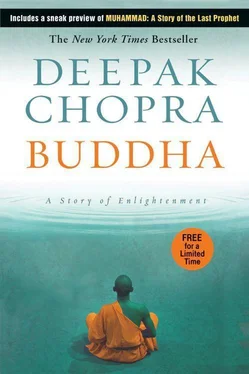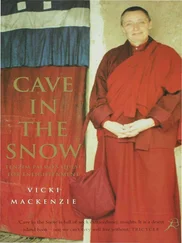“Drunk, maybe. That type can throw you off your head, that’s for sure.” Pabbata stopped for a second and then replied, “So you must be a saint too. Like attracts like, isn’t that how it works?”
“Not in this case.”
Pabbata shook his head, frowning. “You shouldn’t talk about yourself that way. Karma is shy. It’s easy to drive the good kind away.” He sped up to rejoin his cousins. Gautama lagged behind, and after a moment he heard loud laughter and banter. He was tempted to fade back and lose the other monks, but he didn’t. Pabbata looked over his shoulder and saw Gautama a few yards behind them.
“Don’t be shy, princess!”
The jibe, like everything Pabbata said, was good-natured. Gautama could do worse than travel in such company. Maybe the next town or the next teacher could offer him some answer. And so the saffron-clad sojourners walked on together for several days. Gautama lightened the time between farmhouses by finding fruit and fresh water that the others couldn’t spy; in return, they were much more persuasive beggars and flirted with the country wives for extra roti and rice. “This one makes good mango pickle. It’s worth a kiss behind the barn,” one of the cousins said with a wink.
One morning Gautama had gotten up before dawn, as he was accustomed to do with his master, and meditated in the faint blue-gray light. He washed himself in a stream and shaved his beard with the sharp shell of a freshwater mussel. As he walked back to camp, he felt a strange sensation. After a moment he realized a cool breeze was tickling the back of his neck. The morning was already heavy with heat, and he stopped. He raised one hand and could definitely feel a cool current of air around his head. Gautama had felt such a sensation around his master without comprehending why.
Gautama turned his steps and headed back toward the main road instead of to camp. He hadn’t met a better person the whole time he’d been wandering. And yet he couldn’t stay now, not if it meant being turned into a false god.
Emerging from the thick jungle growth, Gautama saw that the main road was crowded with travelers. He ducked his head and kept as close to himself as possible. But he couldn’t help becoming part of the passing parade. Farmers’ carts were a constant sight, trundling to market and home again. There was the occasional merchant caravan, usually surrounded by armed guards to protect the precious bales of silk and spice stowed in a horse-drawn wagon.
Gautama regarded them all with troubled eyes. They were like phantoms to him, no longer made of flesh and blood. They were dream images that he could pass his hand through if they came close enough. As their bodies faded, he saw something else more clearly. Each person carried an invisible burden. The young monk was amazed that he hadn’t seen it before. Everyone walked or rode with their lives on their shoulders, a pack of memories that spilled over with disappointment and sorrow. This one had never recovered from losing a wife in childbirth. That one was afraid of starving. That other one fretted over a runaway son who may have died in battle. And always there was the pall of age and sickness, the endless worry over money, the unceasing doubts about the future.
“Look!”
A small child, bolder than the others, pointed at Gautama, then jumped down from the cart he was riding in. He ran up and tugged at the monk’s saffron skirt with a smile. The boy didn’t beg for anything; he just held on to the skirt and walked beside Gautama. Instead of scolding him or calling him back, the parents nodded benignly.
“I have to find my brothers again,” mumbled Gautama. He removed the little boy’s hand and turned around. Walking away, he could hear the child crying behind him, and this, as much as the stares people were giving him, distressed Gautama. He’d heard children crying like that many times, when there was no food or the kind Prince Siddhartha had run out of coins for them. But Gautama had given this child nothing and taken nothing away. Except himself.
Gautama found the path that had led him to the main road, and soon he was swaddled in the protective gloom of the jungle. The five cousins would still be in camp. They were never eager to travel in the heat of the day. Once he found them, Pabbata looked puzzled over why Gautama had been gone so long, but he kept this to himself. Solitude was a monk’s privilege, one of the few. Gautama had taken the precaution of gathering some mangoes on the way, which placated the other cousins in case they had questions to pose. He lay down under a tree, gazing up at the dappled light that filtered down and made small white circles on the forest floor. He couldn’t find a way to fall asleep as the others dozed off.
Own nothing. Give everything.
It was all he could think about.
“DO YOU RECOGNIZE ME?”
Gautama lifted the sick man’s head and brought a water gourd to his lips. The man had been unconscious when the novice monks, the bikkhus, found him. Only Gautama thought he was still alive. He ordered the bikkhus to put the body in his tent and leave the two alone. They obeyed without question. First, because wherever Gautama went, from camp to camp, ashram to ashram, he was revered. He had emerged from the forest only a year before, yet many of the novices whispered that someone like him, a man of stature and power, should be master, not a worn-out old yogi.
There was a second reason too. If the man they found in the forest actually was dead, Gautama might bring him back to life. Miracle stories swirled around him, and no amount of discouragement on Gautama’s part could make them die down.
“Do you recognize me?” Gautama repeated when he saw the old man’s eyes flutter and then open.
“I-I’m not sure.”
Hunger and dehydration had made the man’s mind weak. He looked around the tent, baffled at how he had gotten there. Then his gaze returned to Gautama’s face and stayed there. “Ah,” he said. “The saint.”
“That’s what you called me, Ganaka. But don’t worry. Didn’t you also tell me that saints don’t exist?”
Feeble as he was, Ganaka summoned a cynical smile. “You waited this long to prove that I’m wrong?”
His head fell back; he struggled with another wave of delirium. Ganaka had been found deep in the forest, sheerly by accident when the bikkhus were chasing down a deer with bow and arrow. “I didn’t ask for your help,” he mumbled. “It’s my life. Who are you to save it?”
“Weren’t you about to give it away?”
Gautama had sensed such a possibility. Someone as experienced as Ganaka didn’t just wander away alone unless it was to die. The careworn monk turned his head away and refused to answer.
“We’ll talk later,” Gautama said. He placed water and fruit beside the cot and departed. Outside the tent his eyes saw dozens of huts in the large clearing. It was spring, and the younger bikkhus were feeling the effects-they exercised, argued, talked in secret about girls they had left behind. Some missed home too much. Every day the weather was fair, a few more failed to show up for evening prayers. Spring had more power over them than God.
Gautama walked among the campfires. By now he had explored every city in the kingdom and those that lay far to the east, but he had avoided the temptation to set foot inside the gates of Kapilavastu. As the word spread and scores of villagers and farmers traveled out to find him and receive his blessing, some were from Sakya and remembered him. If they murmured “Prince” or “Your Highness” when they prostrated themselves before him, Gautama took no notice, gave no hint to acknowledge who he once had been. Four years had made Gautama into Gautama.
Of course he could still conjure up the old faces. But they didn’t return on their own anymore. In order to see images of Channa or Suddhodana, he would ask to see them. “Learn to use your memories,” he told the younger bikkhus. “Don’t let them use you.”
Читать дальше












